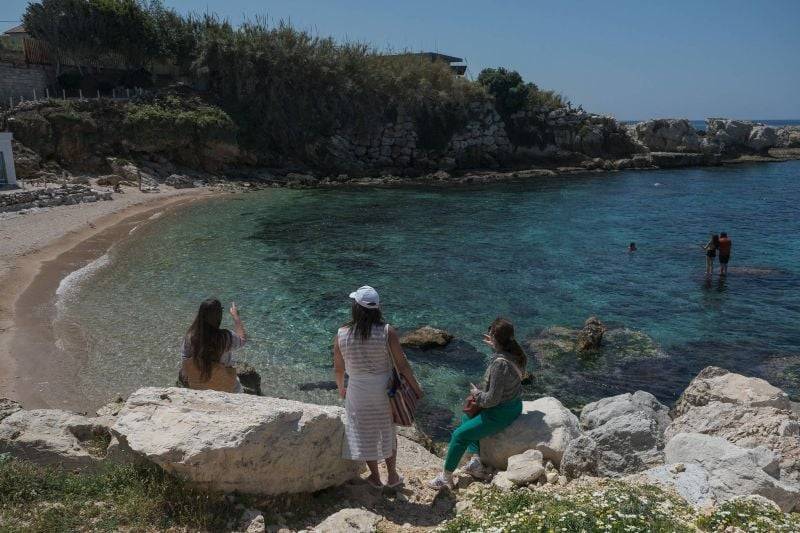
Abou Ali beach in Kfarabida, a paradise spot very popular with swimmers. (Credit: João Sousa)
A troupe of sea-goers makes their way along the steep roadside path leading to a turquoise bay shimmering like gold.
“We’ve been coming here for years,” said Emilie. “It is incredibly beautiful and makes us forget everything. There are still very few places like this in Lebanon.”
Like many, this particular spot is Emilie’s favorite in Kfar Abida, Batroun.
The Abu Ali public beach seems like one of the last coast-line havens still accessible to the public, but for the past few weeks, this Batroun favorite seemed to be meeting the same fate that has befallen many other public beaches in Lebanon.
On April 6, in a campaign called Coast for All, activists denounced violations of this public space in Kfar Abida. Similar violations have taken place is other parts of Batroun and across the country, in coastal areas like Jiyyeh, Jbeil and Jounieh.
An inalienable public space
Implanted on the site of the Abu Ali public beach is a rectangular white house with blue shutters. Built intrusively in the sand, it disrupts the landscape. At first glance, one would think it is a regular house on the Mediterranean coast. “This house belongs to an influential man who bought a small shack and gradually enlarged it,” said Mohammad Ayoub, coordinator of the campaign.
“Earlier this month, he started building a wall to close off the only remaining access to the beach before activists intervened to stop the work and have it [the wall] demolished,” Ayoub said. “The recent iron poles that could be seen on the roof of the house point to a plan to add a floor, perhaps to turn it into a restaurant.”
One wall of the house is decorated with graffiti that reads, “No restaurant!” Speaking to L’Orient-Le Jour, a representative of the Kfar Abida municipality said that the recent construction of the wall along the road and the renovation of the stairs leading down to the beach were carried out without the permission of local authorities. He added that the “owners” of the house had been blocking public access to the beach via the stairs with iron bars t for years.
“The municipality has never received any application for a construction or business permit at the Abu Ali beach,” he continued, confirming that the house was built on public land without a permit.
Speaking to L’Orient-Le Jour, Ziad Bassil, the house’s owner, said he “bought this land in 2005.”
“The house was built before the Civil War [1975-1990], as were the stairs. I added the fence to delimit my private property. There is nothing wrong with that, as long as I allow people to swim,” he said. Four years ago, Bassil rented out the land to a woman “who plans to make investments there.”
One of the few free sites remaining
In early April, the Coast for All campaign activists submitted a request to the Ministry of Public Works in hopes of restoring public access to the beach and having the house demolished. Caretaker Minister Ali Hamieh did not respond to L’Orient-Le Jour’s request for comment and his adviser said he did not know about the case.
“It is illegal to build any construction on the public maritime domain,” said Ayoub. “They are eliminating the last free public spaces in an attempt to create financial windfalls,” he added. Ayoub is also the head of NAHNOO, an advocacy platform for the participatory development of public policies.
In Kfar Abida and neighboring Thoum, this is not the only case of encroachment of public maritime property. Between the two towns, about half a dozen construction projects have been carried out in recent years without permits.
An environmental issue
“There are many projects to privatize the Lebanese coastline, while no one, even the state administrations, has the right to touch the public maritime domain and close access to beaches,” says Isabela Serhan, a researcher at the American University of Beirut’s Beirut Urban Lab.
The encroachments violate Law 444 on the Protection of the Environment since they involve obstructing the view of and access to the beach. Under a legally binding decree issued in 1925, any permanent construction on the public domain and the sectioning of the Lebanese coast is prohibited.
Serhan said that both local and national authorities have made exceptions to the law, granting long-term work and business permits to people who are close to senior officials. “Violations by private entities are thus protected by public authorities, disregarding the environmental impact of such projects,” she said.
Since the encroachments affect the environment and its biodiversity, it is the responsibility of the Ministry of Environment to monitor such cases. Caretaker Environment Minister Nasser Yassin said he referred the Abu Ali beach file to North Lebanon public prosecution for environmental affairs. He said that he has not received any study on the environmental impact of any project on this beach — a prerequisite for obtaining any business permit. While the future of Abu Ali Beach remains uncertain, activists continue their efforts to preserve the site.
This article was originally published in French in L'Orient-Le Jour. Translation by Joelle El Khoury.